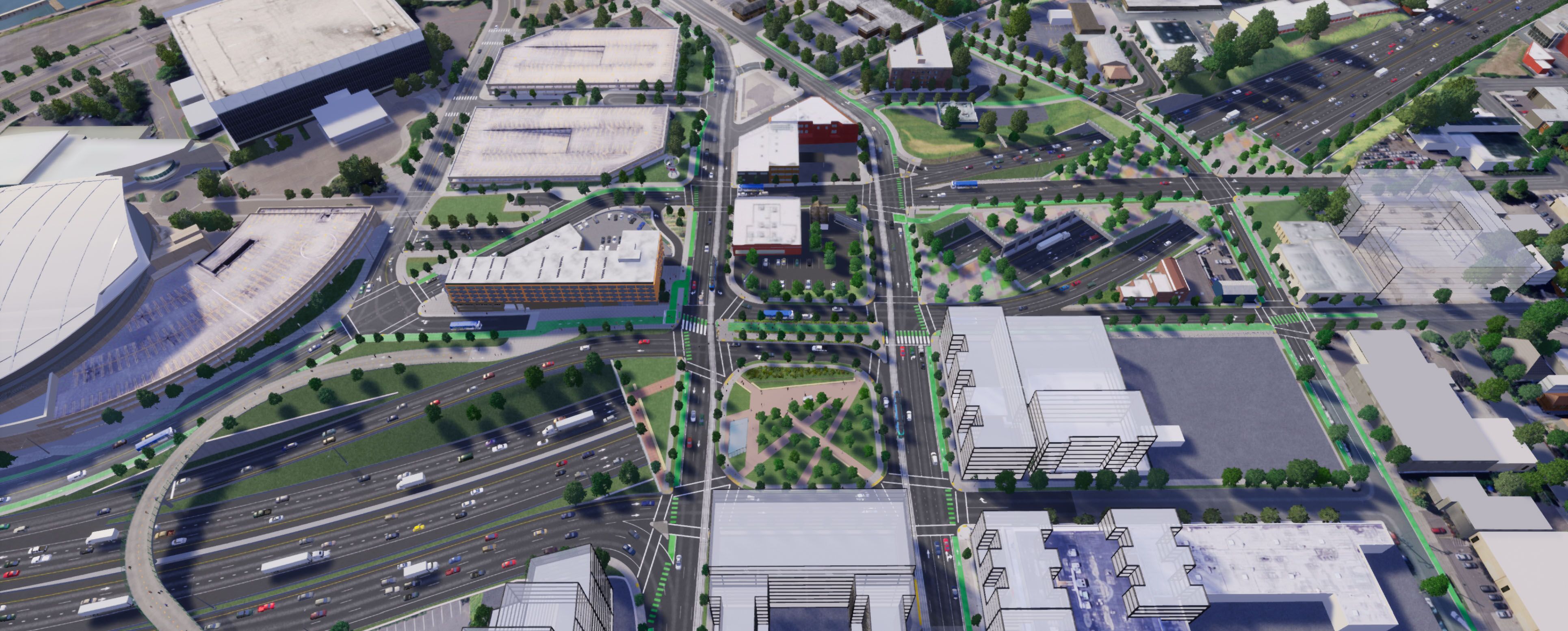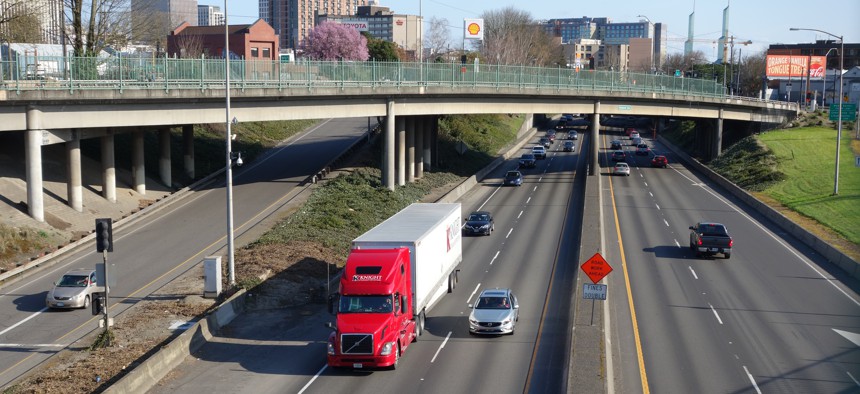Connecting state and local government leaders
Residents of the Oregon city known for its resistance to the car are rallying against a proposal to widen the interstate. Instead, some say the solution should be tolls.
A plan by Oregon transportation officials to widen a short section of Interstate 5 in central Portland, a half-billion dollar construction project that will pinch traffic flow for as long as five years, has sent tremors through city government and neighborhood communities.
The concerns aren’t just about the expected congestion during the work or even air pollution. The city of Portland remains, within transportation planning circles, a kind of North Star both nationally and internationally as one of the few cities that resisted the embrace of 20th century road-building. Archivists often point to a multi-lane elevated highway that, if not defeated in 1974, would have stretched eastward from downtown towards Mt. Hood, obliterating vast tranches of quiet, pre-war housing. Since that time, Portland has stood as an example of all the good things that can happen if you successfully push back against the car. Namely, dense residential neighborhoods safe for children, with good access to nature, bikeways, and public transport—features which now have made Portland one of America's most popular cities.
Unsurprisingly, the plan to widen I-5 is attracting attention across the country. Janette Sadik-Khan, a former New York City transport commissioner and author of “Street Fight,” was particularly pointed. "Portland, once the king of sustainable transportation, could now be jester," she wrote on Twitter. Sadik-Khan, a consultant to transportation departments worldwide, represents a contemporary wave of new thought that seeks to humanize urban streets by putting them on diets—narrowing them, not widening them. The Oregon Department of Transportation’s plan for Portland today is very much against the trend. Cities like Boston and San Francisco have turned away from investing further in sections of urban freeways and instead cut them off or taken them down altogether. A recent study from Spanish Bank BBBA showed outright car bans from Madrid’s city center triggered a sharp increase in retail sales during the 2018 winter holiday season. And who was early to downtown freeway removal? Again, Portland, which tore down Harbor Drive and replaced it with today’s Tom McCall Park—also in 1974.
But Portland’s embrace of a less-car centric lifestyle came after the original construction of Interstate 5 in 1966. There’s no question the sections through downtown need repair. ODOT characterizes its proposal not as a widening, but a clearing of a bottleneck. Agency officials say the plan to add lanes, while not expanding the actual footprint, will result in better throughput (transport-speak for faster travel times) and safety improvements will come from the placement of auxiliary lanes to accommodate crashes. Most surprising, however, is the state’s assertion the project will slightly reduce greenhouse gas emissions, presumably from a decrease in vehicle idling. So far, however, the fine details of that projection have not been provided in the draft Environmental Assessment by the city and state, which has been a source of criticism from community members.
The state legislature in 2017 approved the $500 million for the project as part of a larger transportation package, and the plan has also won at least tentative support from key city leaders, including Mayor Ted Wheeler. For now, the city is supporting the state’s marketing of the proposal as a de-bottlenecking, rather than a widening.
Some of the Portlanders who lived through the battles in the 1970’s were present again at a raucous I-5 public hearing, on March 12th, determined to make their voices heard. Paul Rippey, a local resident, actually sang his protest with a guitar, “In the 60s we built the interstate, let’s stop the madness now before it’s too late. You see the thing we need to understand, is, induced demand.” Twenty years ago, the counterintuitive notion that highway expansions could result in more cars on the roads instead of faster commutes was understood only by urban theorists. Today that idea, induced demand, is widely accepted. And many community members who rose to speak against the plan cited this quandary. “It really is so very tedious to have explain basic concepts like induced demand, and the affect highway expansion can have on nearby residential surface streets, to people claiming to be transportation experts,” said one Portland resident.
In a subsequent interview with Oregon Public Broadcasting the ODOT project coordinator, Megan Channell, pushed back on the specter of induced demand, saying the project was mostly meant to smooth the interchange between several intersecting interstate highways, including I-84 and I-405. “It’s making it easier for drivers to merge and weave between three interstates where they don’t have that safe space to do so today,” she said.
But perhaps the threat of a large upgrade to Interstate 5 may force a different, though politically challenging, solution: congestion pricing. Metro Councilor Sam Chase, who noted especially how the African-American community had disproportionately shouldered all the previous losses to neighborhoods from the original I-5 construction, urged strongly that congestion pricing should be made an important feature of the project. “And Metro would very much like to be part of that option,” he said.
The challenge in introducing road pricing comes in part from federal control over interstate highways. In New York City, where the first congestion pricing scheme in the U.S. is poised to unfold (the New York legislature over the weekend passed its budget including the plan), the policy path to a solution did not run through Washington. According to reports in the New York Times in late March, a large block of the city—roughly from 60th Street south to the Battery—will trigger a $10-a-day-charge for car drivers when the plan comes into effect. The scheme is similar to one in London that began 15 years ago, and has seen traffic decline by as much as 35%. Knock-on effects have also been realized, with bus travel times improving in central London. In New York, both Gov. Andrew Cuomo and Mayor Bill De Blasio want to use the funds raised to make long overdue repairs to the MTA bus and subway system.
"It takes a lot of political gumption to get people to pay for something they've not previously paid for," explains Chris Hagerbaumer, deputy director of the Oregon Environmental Council. The effort to introduce such pricing in Oregon, however, is proceeding on a separate track to ODOT’s highway upgrade plans precisely because it’s a federal level decision. A state legislative bill passed in 2017 directed the Oregon Transportation Commission to come up with a plan to implement value pricing to present to the federal government.
"We were excited that in 2017 legislators finally got it—that we are going to have to manage demand on our roadways. We do not have the money to build a bunch of new capacity," says Hagerbaumer.
Tolling and road pricing are still relatively new in western states compared to the East Coast. But the recently built tunnel through central Seattle, which replaced the elevated viaduct, will scale rates from $1 overnight during off peak to $2.25 during the afternoon rush hour. Meanwhile, the Oregon Transportation Commission (OTC) did, in fact, make its application to the Federal Highway Administration at the very end of 2018. The final request targets two stretches of local interstate highways: on the 205 south of the city and, of course, the 7 mile section of I-5 running through the city itself. But even with a long process to obtain a not-certain federal approval, Portland could have an answer on congestion pricing before the widening project is expected to start in 2023. So, could this prove to be the solution?
For Hagerbaumer, the answer is clearly yes. "At its core, by decreasing demand you are increasing capacity,” she said.

With a fast-growing population, Portland’s national brand as a city both hostile to the car, and safe for cyclists and pedestrians, is currently under pressure. Recent data indicates that, as in the rest of the country, cars have risen steadily with Portland’s popularity and the city has struggled to live up to the ideals of Vision Zero—a national movement to eradicate urban road fatalities. Not only have some community members raised questions about how the ODOT will rearrange the interstate, they have also questioned agency plans for adjacent surface streets. In the ODOT plan, rather than constructing full, overhead covering caps that would block out freeway noise and could be utilized as parks, a checkerboard pattern has been offered up instead. At the recent public hearing, many citizens said these half-caps would simply become stranded dead-lands, cut off from each other by the still over-broad surface streets which already make pedestrian and bike travel difficult through the Rose Quarter. A proposed bridge to loop over the highway to ease bike commutes was also not met with enthusiasm.
Portland’s challenge may indicate that despite its unique brand, it participates nevertheless in national trends. A recent study published in PNAS showed that air pollution is disproportionately suffered by American communities of color. Indeed, this issue happens to be very much alive in ODOT's highway expansion proposal because the highway itself originally bulldozed a largely African American neighborhood; and today the Harriet Tubman Middle School remains so close to the highway that a Portland State University study, released last year, advised that children’s outdoor activities should be limited. Moreover, recent analysis by Bloomberg showed that America’s love affair with large(er) vehicles now demonstrably leads to an increase in road fatalities.
Critics say ODOT’s highway proposal is like an air-drop from the middle of the 20th century, at a time when Portland city residents are already asking for significant capital improvements to improve safety on myriad surface streets. “ODOT's singular focus appears to be on moving cars, rather than seizing the opportunity to improve people movement in this area, and to redress some of the harms that occurred when we widened the freeway originally and destroyed neighborhoods,” added Hagerbaumer. "I don't know why, after all this time and the era we are in, there wouldn't be a more holistic approach."
Finally, it’s not clear at all, to those contacted by Route Fifty, what will happen with the I-5 proposal. At the public hearing, Sarah Iannarone, a former mayoral candidate, faced the ODOT representative and said bluntly, “Your project will never get built. We will be lying down on that highway, before it gets built.” City Commissioner Chloe Eudaly—who at the meeting allowed she was reluctant to oppose the plan outright, while saying she will push for a reworked project—pointed out that the city of Portland itself does not have the power to redirect the proposed $500 million cost of the project to other city-based plans. Several weeks later, however, Eudaly, the city commissioner who carries the transportation portfolio, announced on her Facebook page that after much study, she had concluded the project “will not deliver meaningful safety, environmental, or equity benefits.” More strongly, however, Eudaly emphasized that in her view congestion pricing offered the best solution and encouraged the community to urge the Oregon Transportation Commission to put in place a congestion pricing program “before any work takes place” and to make such pricing a full feature of the project.
Gregor Macdonald is a journalist who regularly covers cities, climate and energy. He is based in Portland, Oregon.

NEXT STORY: GSA IG dings FedRAMP on goals and objectives



